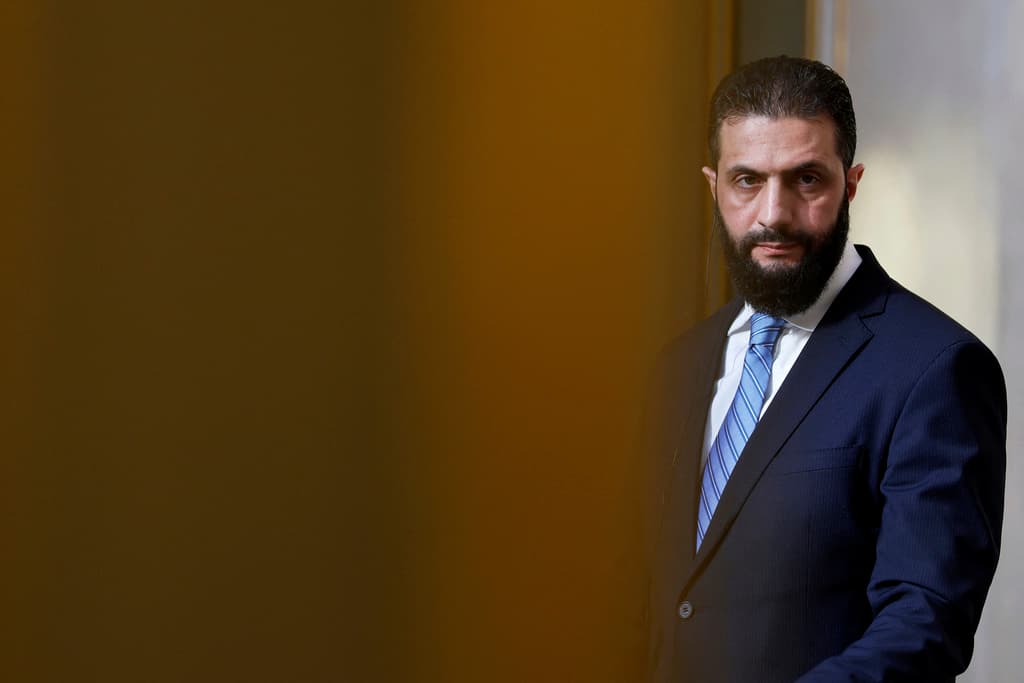Quiet White House Visit by Syria’s Acting President Causes Trepidation in Israel
The former jihadist terrorist, who became the first-ever Syrian visitor to the White House, is leaving Washington with tangible rewards.

Although the White House visit by Syria’s acting president, Ahmad al-Shara, was conducted in uncharacteristically hushed tones, it marks a significant shift in America’s policy toward that country — sparking some trepidation in Israel.
Following a two-hour meeting with President Trump on Monday, Mr. Shara left the way he came in: through the White House’s back entrance. The now-familiar presidential greeting at the front entrance was absent, as was the extended press conference that Mr. Trump habitually conducts with high-level guests.
Yet the former jihadist terrorist, who became the first-ever Syrian visitor to the White House, is leaving Washington with tangible rewards. Those include an end to the sanctions against him and aides, as well as against the country he leads. In return, Mr. Shara vows to join an American-led anti-ISIS coalition and work toward agreements with neighboring Israel.
Many Israelis are skeptical of Mr. Shara’s conversion from a leader of an Islamist terrorist group, Hayat Tahrir Al-Sham, to an anti-terror fighter. They consider the man formerly known as Abu Mohammad al-Joulani a wolf in sheep’s clothing. “I understand, as an Israeli, that this train has already left the station, but we need to remain vigilant,” the founder of Alma Research Center, Sarit Zehavi, tells the Sun.
“I like him, I get along with him,” Mr. Trump said after Mr. Shara’s Monday visit. “We’ll do everything we can to make Syria successful because that’s part of the Middle East. We have peace now in the Middle East.” He added that “we are working also with Israel, on, you know, getting along with Syria, getting along with everybody, and that’s working amazingly.”
A security deal between Damascus and Jerusalem is widely expected to be completed before the end of the year. Yet it is unlikely a pact would include a mutual recognition agreement that would add Syria to the peace camp known as the Abraham Accords.
Mr. Shara’s “world view is very different from that of the American world view,” Ms. Zehavi said. “His world view is that there is a gap between an agreement and its implementation, and that to reach his goals he can sign anything. Joulani’s goal is to ‘make Syria great again,’ which is why he went to Washington. But he didn’t go there to make Syria a Western country.”
Prior to the Monday visit, the United Nations Security Council passed an American-proposed resolution last week that ended sanctions against Mr. Shara and a lieutenant dating back to their days as leaders of a terrorist group. Washington also seemed ready to repeal the 2019 Caesar Act, which imposed sanctions on Syria when it was ruled by President Bashar Assad.
“A free, united, prosperous Syria is the biggest opportunity since the end of the Cold War,” Representative Joe Wilson, a South Carolina Republican who is on the House committee on foreign affairs, wrote on X after meeting Mr. Shara Monday. “We must give Syria a chance and achieve a complete and total repeal of Caesar.”
Seemingly timed to the Washington visit, the Saudi-backed al Arabiya network and other publications reported on two ISIS assasination attempts against Mr. Shara since he became the Syrian leader. “These are factual, but not new,” Ms. Zehavi said, noting that reports on those assassination attempts appeared in several publications weeks ago.
Mr. Shara has battled ISIS during his days as leader of an Al Qaeda-affiliated group known as HTS. He recently met with the commander of the United States Central Command, Admiral Brad Cooper, to coordinate the new campaign against the Islamic State.
Mr. Shara is seen as someone who could block arms transfers to Hezbollah from Iran in Lebanon. Israeli sources, though, tell the Sun that despite the enmity between the new regime at Damascus and the Islamic Republic, arms seep through Syria to Lebanon — and that some allies of Mr. Shara are bribed to ignore such smuggling.
Mr. Shara is strongly supported by Turkey, which is hoping to establish bases in Syria, to Israel’s chagrin. Ankara’s foreign minister, Hakan Fidan, reportedly was at the White House on Monday during Mr. Shara’s visit. America’s ambassador to Turkey, Tom Barrack, said that there is “no plan B” to maintaining Mr. Shara’s hold on power in Syria.

